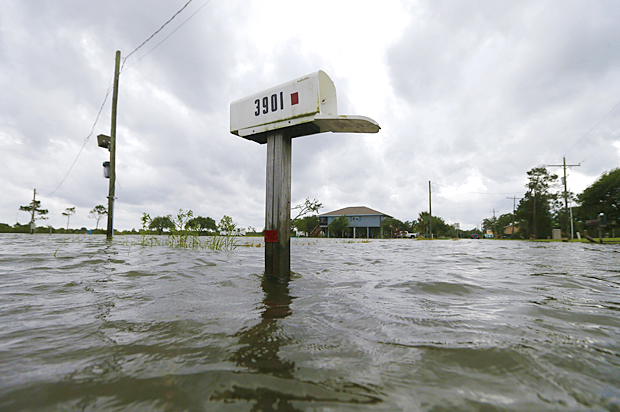
Long before the state overwhelmingly voted President Donald Trump into office last November, those in Louisiana’s swamp were already critical of Washington’s.
To say that the last two presidential administrations disappointed Louisiana would be an understatement. President George W. Bush was lambasted for how he handled Hurricane Katrina, and some believe President Barack Obama deliberately targeted the state’s oil and gas industry. Many in the state see Trump as a saving grace, a one-eighty from Obama.
But the new-administration high has begun to die down, at least partially because Trump’s fiscal year 2018 budget proposal, released in May, does not fund critical flood infrastructure.
That disheartened those closer to the coast. “I expected infrastructure — whether it be roads, bridges or hurricane protection — to be part of this administration’s initiatives,” said Louisiana state Sen. Dan Morrish, R-Jennings, who this year pushed a bill that spearheads one of the state’s biggest coastal plans in a decade. “I’m beginning to believe it’s just roads and bridges . . . There’s no need to protect those roads and bridges if there’s no one to drive over them.”
Trump’s proposal repeals heavily relied-on offshore oil revenue funds for Louisiana coastal protection and other Gulf states. It also leaves out about $1 billion for flood infrastructure and ports funded through the Army Corps of Engineers.
Both funds are crucial for executing several, long-awaited projects that experts say mitigate Louisiana’s land-loss and save the Mississippi River Delta’s national trade hub, as well as preserve oil, gas and seafood industries that benefit the entire country.
The Louisiana delegation, which contains powerful players such as House Majority Whip Steve Scalise, R-La., and Black Caucus chairman Cedric Richmond, D-La., is unified in retaining the oil revenue. Keeping the funds should be easy: the offshore revenue can’t be redacted without congressional approval. On top of that, this has happened before: Obama’s 2015 budget proposal put the oil revenue in only after Congress pushed back. This year, the Louisiana delegation assures the sinking state that a federal budget without oil revenues is a non-starter and that neither they nor fellow Gulf state congressmen will vote for one without it. The latest House appropriations bill prevents cuts to the revenue.
“I know people are impatient,” said U.S. Sen. Bill Cassidy, R-La., in June. But he and others in the delegation seem sure that the new president is dedicated and wants to protect their state, despite the learning curve.
Meanwhile, getting other funds back is less likely. This includes separate federal funds for other Louisiana coastal projects, such as those through the Army Corps — and Gulf state lawmakers may not have a problem with that.
Many in Congress — including U.S. Rep. Garret Graves, R-La., who helped spearhead the oil revenue-sharing program 10 years ago — are trying to find ways to circumvent the Corps to complete local projects because, Graves says, the Corps has a reputation for not delivering projects at a time- and cost-efficient manner.
So while other funding sources are on the backburner, the offshore oil revenue is the primary concern. Aside from the multi-billion 2010 BP oil-spill settlement, the oil revenue is considered the backbone for coastal funding projects, including one that proponents say would reduce flood-related damage by $150 billion over 50 years. If re-appropriated in the 2018 budget, it would also be the primary source of recurring revenue to Louisiana from the federal government — $140 million per year maximum, depending on the price of a barrel of oil.
The oil revenue has been a bitter topic for 10 years because benefitting states feel they are getting the short end of the stick: interior states get half the production revenue through a similar federal program, while Louisiana and its fellow Gulf states — Alabama, Mississippi and Texas — get 37.5 percent of offshore oil revenues. Louisiana feels entitled to more than it receives. Money comes from oil is drilled in federal waters, and who owns that water has long been debated. But if it comes from our coast, it should be spent on our coast, locals argue.
Since the budget came out, Plaquemines Parish President Amos Cormier, whose peninsular jurisdiction sits at Louisiana’s southernmost point, spent part of his summer in a Texas library researching the age-old Tidelands controversy. The Supreme Court sided with the federal government to limit coastal oil revenues from Louisiana, which Amos says cost his state trillions in mineral royalties. Amos said watching it happen yet again has him prepared to fight.
“We’re not asking [the federal government] for a handout,” Cormier said. “We’re just asking get your hands out of our pocket.”
While Louisiana won’t get the federal government’s handout, it should get the cash back in. Louisianans are confident their congressmen will protect the state from feared obstruction, should this administration disappoint them in ways that previous ones have.
The question now is how local and Washingtonian premonitions will shape Louisiana’s increasingly frictional relationship with a new president, who promised to rebuild, protect and put his slowly submerging continent first.

